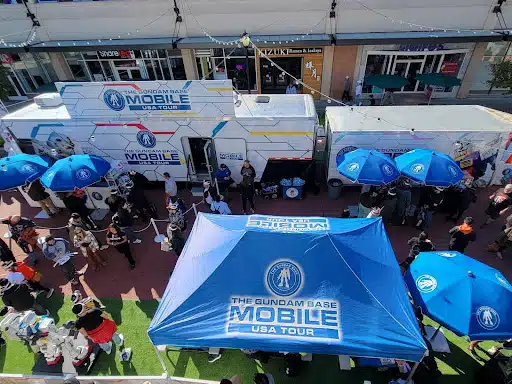If you’ve been keeping up with this blog, by now you know that the trade show is dead. The days of packing up your sales team and products to visit exhibit halls in Las Vegas, Chicago, and Houston are over. The trade show industry is going to continue to lose steam and this will continue to present challenges to B2B companies who rely on their customers seeing, touching, and trying out new products and services.
Today, the trade show has been replaced with something more exciting: A professional field trip. A mobile roadshow, functioning as a reverse-trade show, fosters that field trip excitement in the customers and prospects you visit. Simply put, the roadshow provides the experience trade shows wish they could offer. As we wrote in our last blog post, even veterans of direct sales and roadshow skeptics are realizing the benefits of this modern approach.
Roadshows just make sense as a strategic element of the future of B2B sales. These mobile trade shows place products directly in front of the decision makers, speeding up the decision-making process and fostering loyalty after the sale. Salespeople benefit from these shows because they are great tools for helping customers along in the sales process. The future success of mobile roadshows will depend on maximizing the latest technology to have the biggest impact on customers and prospects.
THE MOBILE ROADSHOW
 In our previous work with Hussmann refrigeration, Pro Motion’s team used virtual reality to show what the line of refrigerated cases would look like a store. VR has many benefits that make it a great partner to experiential marketing approaches. These same benefits apply to the mobile roadshow, where VR facilitates showing the features of products without requiring the transportation of every product model being sold. The VR exhibit on the Hussmann Insight tour allowed users to experience a grocery store filled with Insight cases in their natural environment filled with produce, meat, seafood, and other refrigerated foods.
In our previous work with Hussmann refrigeration, Pro Motion’s team used virtual reality to show what the line of refrigerated cases would look like a store. VR has many benefits that make it a great partner to experiential marketing approaches. These same benefits apply to the mobile roadshow, where VR facilitates showing the features of products without requiring the transportation of every product model being sold. The VR exhibit on the Hussmann Insight tour allowed users to experience a grocery store filled with Insight cases in their natural environment filled with produce, meat, seafood, and other refrigerated foods.
We took a similar approach with another B2B client, Vertiv. Vertiv designs, builds, and services equipment needed for data centers, communication networks, and commercial and industrial facilities. Its industrial products, which are thermal units that cool data processing centers and backup redundancy power units, are far too big to fit into touring vehicles. Does this mean we had to give up on Vertiv’s show before it got on the road? Of course not! Pro Motion stepped in to help Vertiv execute this large mobile tour in a way that worked for their unique products. We loaded up two trucks with technology that allowed Vertiv to show off their products while still keeping that field trip feeling and reaching a large number of prospects. The two trucks made over 100 customer stops in only 6 months!
equipment needed for data centers, communication networks, and commercial and industrial facilities. Its industrial products, which are thermal units that cool data processing centers and backup redundancy power units, are far too big to fit into touring vehicles. Does this mean we had to give up on Vertiv’s show before it got on the road? Of course not! Pro Motion stepped in to help Vertiv execute this large mobile tour in a way that worked for their unique products. We loaded up two trucks with technology that allowed Vertiv to show off their products while still keeping that field trip feeling and reaching a large number of prospects. The two trucks made over 100 customer stops in only 6 months!
LOOKING TO THE FUTURE
Consider the ways that emerging technologies will make mobile trade show tours even better. They are a great fit for B2B brands selling difficult-to-represent products — think large machinery, technical offerings, or software services. Imagine being able to use the latest technology to demonstrate these products face-to-face with your customers, without the competition and expense of traditional trade shows, and with a better ROI.
Augmented reality and VR soon will transform mobile roadshows into even more immersive experiences. Consider again the example of the Vertiv tour. The trucks were loaded with tons of digital assets that represented the full product line since the product line was way too big to load into a vehicle and transport throughout the country. To make up for those missing pieces, we equipped two trucks with VR technology. Two different stations of headsets and touchscreens were used to allow viewers to immerse themselves in the inner workings of the product, such as examining the inside of a cooling unit’s workings.
Think about how AR could add to this experience in the future. Instead of, or in addition to, the VR headsets, we could hand out iPads to attendees and encourage them to view the mechanical systems through an AR app while a brand ambassador walked them through key features. This is a place where you can get creative to add even more to the experience. When potential customers point their tablets at the part of the system that houses a state-of-the-art motor, a rendering of the motor could be shown. When the brand ambassador talks about the system’s impeccable capabilities, the AR devices could show how all the elements solve their client’s problems.
 In the future, technology will continue to improve and remove common barriers to showing off all the features of your products and services. Technology can also reduce the expense associated with driving multiple large models around the country, instead of a basic model with features that can be demonstrated using AR or VR. The possibilities are endless! With this bright future, mobile roadshows aren’t going anywhere.
In the future, technology will continue to improve and remove common barriers to showing off all the features of your products and services. Technology can also reduce the expense associated with driving multiple large models around the country, instead of a basic model with features that can be demonstrated using AR or VR. The possibilities are endless! With this bright future, mobile roadshows aren’t going anywhere.
Ready to experience the benefits of mobile roadshows for your own company? Pro Motion is an industry leader in creating engaging, effective campaigns. Give us a call at 636-577-8507.
Can’t wait for our next post to learn more? Learn More About Steve Randazzo’s book, Brand Experiences: Building Connections in a Digitally Cluttered World. Click here to download 2 free chapters! Including Chapter 3, all about how to build a B2B trade show tour.




